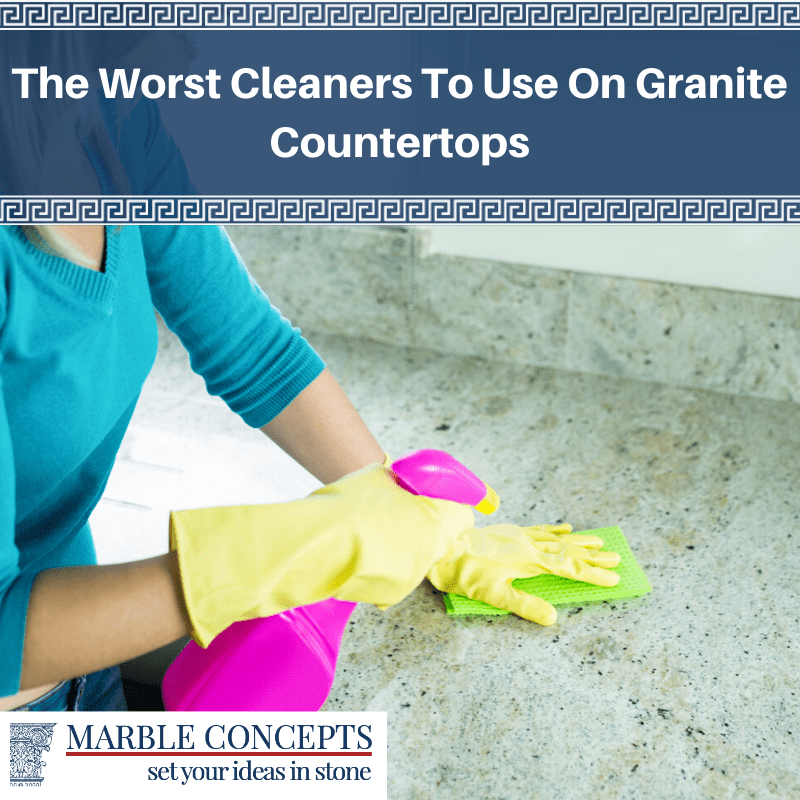Cleaning a granite countertop doesn’t have to turn into a long drawn out scrub fest, but it does mean finding the right products to preserve the beauty and condition of your granite countertops. There are lots of cleaners out there for just about everything, and many of them are just not suited for cleaning granite. If you have granite countertops or are contemplating purchasing them, you’ll want to avoid certain cleaners. So, what are the worst cleaners to use on granite countertops? Here are some of the worst cleaners to avoid using on granite countertops.
Ingredients are the Key
In looking at the worst cleaners for granite countertops, you have to take into consideration the different ingredients in them and how they can damage granite. Many of these ingredients are harsh and abrasive and will strip away the sealers that are used on granite. They can also cause dullness and general damage to granite. When there is no longer a protective sealant, these cleaners can go further into the base of the granite and actually damage and degrade the stone. The ingredients or stand-alone cleaners to avoid include:
- Ammonia – (or any cleaner that contains ammonia)
- Bleach – (or any cleaner that contains bleach)
- Citrus cleaners (orange, lemon and other citrus derivatives)
- Disinfectants
- Glass cleaners
- Grout tile cleaners
- Hydrogen peroxide
- Orange, lemon, or other citrus cleaners
- Tile cleaners for the bathroom
- Vinegar
Worst Cleaners for Granite
You would think that the following common cleaning products would be suitable to use in just about any cleaning situation. With granite, these cleaners should be avoided altogether. Here’s a listing of some of the worst products to use on granite countertops:
Bleach
Bleach is hard on sealers that protect granite countertops. Bleach can deteriorate those sealers. It can also cause staining, as it can soak beneath the surface of granite because of the porosity of granite.
Clorox- Al-Purpose Cleaner with Bleach
Besides the ingredient of bleach, which is damaging to countertops, this all-purpose cleaner contains other harsh chemicals. In addition, there are fragrances in this product that cause wear to the sealant used on granite countertops.
Disinfecting Wipes
Though disinfecting wipes are convenient and easy to use, they can be problematic with use on granite countertops as the citric acid contained in most wipes can be bad for the sealant on granite countertops.
Formula 409
Formula 409 is a bathroom cleaner and disinfectant that works on removing soap scum and other debris from bathroom areas. It contains a number of ingredients that are damaging to granite, so you shouldn’t use it on any granite countertops or vanity areas in a bathroom.
Lysol Lemon All-Purpose Cleaner
This cleaner contains ammonia and lemon, both of which are bad for granite countertops. Ammonia can erode and scratch the surface of granite, and the acid in lemon deteriorates the sealant that protects granite.
Pledge Multi-Surface Cleaner
Pledge has a lemon scent and lemon is corrosive to granite countertops. Citric acid in lemon is damaging to the sealer used on granite and can do further damage to the stone beyond the sealer.
Windex
The ingredients in Windex can cause irreparable damage to granite. Damages can be in the form of dullness, pitting, and stripping of the sealant from granite countertops. Once the sealant sustains damage or is gone altogether, the countertop is vulnerable to stains and other issues.
Windex Multi-Surface Vinegar Cleaner
As Multi-Surface Windex contains vinegar, it will dull granite countertops and possibly cause etching. In addition, most Windex products and all-purpose cleaners are generally unsafe for cleaning granite countertops.
What Products to Use
Since most all-purpose cleaners contain ingredients that are harsh and damaging to granite countertops, how should a homeowner clean and protect their granite countertops? For one thing, there are specific granite cleaners, polishes and sealants that are safe to use on granite countertops. Researching granite cleaners online or speaking with a home improvement store customer service representative or a granite dealer can be of help in finding the right products.
General Cleaning and Care Tips with Granite
Whether or not you use a specific cleaning product for granite, here are a few general tips that can be of help with quick cleaning and proper care guidance for granite countertops.
- Simply use water and a microfiber towel to clean away most of the dirt and debris on granite countertops. Also, use the microfiber cloth in a dry state to wipe away any accumulated dust or debris as a daily routine or before using a specific cleaner.
- Steer clear of using soap. Though soap isn’t damaging, it can leave a residue or film on granite. With time, the film accumulates and will require a special cleaner to get rid of it.
- Remove spills when they happen. Allowing spills to remain on granite countertops for any length of time will wear away at the sealer on the countertops. Once that happens, spills can pass into the granite and create stains and other damage. Spills of acidic liquids or foods can also cause more intense damage. Any citrus related juices or vinegar spills should be taken care of immediately.
Cleaning and caring for granite countertops doesn’t have to be complicated. Following a few simple tips, using cleaners specifically designed for granite and avoiding products with damaging ingredients are the best ways to deal with maintaining granite countertops. If you want to know more about the cleaning and upkeep of granite countertops or just have general questions, complete the online contact form and an expert will get back to you with the answers you need to care for granite countertops properly.






